
When I was but a blinkered knave of an undergrad, I studied for a year abroad in England, and -- apart from the castles and the most fickle pop-music scene in the world -- two things impressed me about the place: 1. English people drink like crazy; and 2. English people observe the world, particularly the United States, with astute, laser-sighted scrutiny. I believe that these factors are related, as perhaps the colossal English intake of alcohol has to do with communal guilt over centuries of conquering and pillaging most of the world; then add in this big, proud country situated between the Atlantic and the Pacific, Mexico and Canada, which effectively told those Redcoat aggressors: "Uh-uh. No. Go home. We're gonna do this our way." That's speculation, but I can tell you for certain that I took a course in England called "Society and Politics in the U.S.A.," and first it scared the hell out of me, then it stripped me of my Gawd-given complacency, then eventually it made me contemplate how the U.S., in general, views itself and the rest of the world. Major personal reboot. (Ta, Britons.)
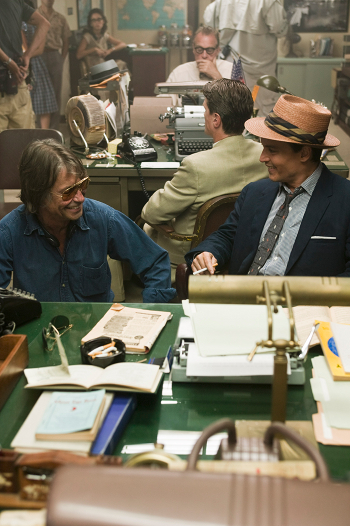
Newsroom, 1960: Robinson directs Depp.
On this note, presently we have in cinemas The Rum Diary, veteran English writer-director Bruce Robinson's wild and wonderful first new feature in twenty years (!), as well as his explosive adaptation of Hunter S. Thompson's very early, long-unpublished novel. It's smart, complex, hilarious and disturbing, and I highly recommend it. Robinson, teaming with the smashing Richard E. Grant, gave us the sozzled and infinitely-quotable classic Withnail & I, plus one of my fave films ever, the fearless consumer satire How to Get Ahead in Advertising. Now The Rum Diary -- which stars its producer Johnny Depp as a dewy, idealistic version of his late mentor and fellow Kentuckian Thompson -- functions like an exotic hybrid of the two, delivering funky fun for hipsters plus full-frontal satire, as well as romance and adventure for the multiplex crowd, and even cultural illumination for those unfamiliar with the Puerto Rico of the Ike era. A potent serendipity also attends the film, as its stark themes (forced displacement of lower classes; belligerent Capitalist development; journalistic integrity and lack thereof) perfectly dovetail with the economic, political and social concerns of here and now.
I spoke with Robinson about his impressive creation, citing one of the film's best lines (spoken by Depp as hapless journo Paul Kemp): "I put the bastards of the world on notice; I do not have their best interests at heart." Thompson line, or Robinson line?
"That's mine," Bruce confirms. "There are only two Hunter lines in the whole script, actually. The rest is, for good or ill, totally me. The best thing is, 'Is that you? Or is that Hunter?' That is the supreme kind of compliment. If people come away not knowing who wrote it, that'll be fantastic. Because that means we kind of welded somewhere." (Note: Thompson was undoubtably creative, but when I hear Depp's frenzied delivery of a line such as, "Your tongue is like an accusatory giblet!" -- clearly that's the Robinson my friends and I love to quote.)
Bruce continues, "Hunter had such a distinctive voice, as we all know, but I think this is one of these aspects of the Rum he couldn't know (in his early 20s), because he was living it; and I had the luxury of a retrospective look at The Rum Diary, i.e.: the stuff that he wrote ten, fifteen, twenty years later could be an influence on me putting this one together."
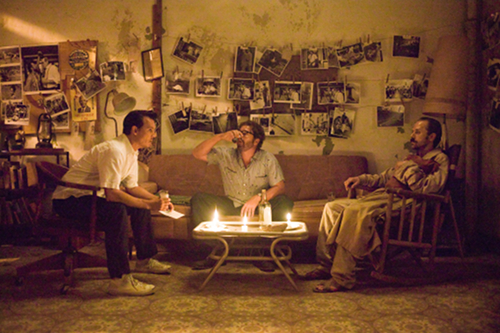
Rumpled journos: Depp, Rispoli, Ribisi.
Depp is about two decades older than his character in the book, yet with his cutesy fringe of bangs constantly wagging in his hopeful eyes, he feels eons younger than his portrayal of Hunter's Raoul Duke in Terry Gilliam's Fear and Loathing in Las Vegas (from way back in '98). What's up with that?
"There was a scene, when he first arrives at the newspaper, that we cut. And what it did was to explain why Johnny is 47 years old -- why a 47-year-old guy is coming down to this dead-end place to take on a dead-end job. It was an expositional scene, and I thought it was quite funny the way we did it. But, you know, when you put the film together, you think: people are either going to go for the ride or not go for the ride. If someone, five minutes in, is saying Johnny is too old for this part, then they're never going to bother with the movie anyway. So we just threw caution to the wind and didn't explain. But I can't see it working with a 22-year-old, almost a boy. I don't think it would work if it wasn't an actor with Johnny's substance."
The cast, featuring Aaron Eckhart as a sleek upscale slimeball, Amber Heard as his wandering moll, Richard Jenkins as Depp's stroke-baiting editor, Michael Rispoli as Depp's loyal yet issue-laden cohort, and Giovanni Ribisi as drugs incarnate, craftily deliver this tale of Truth vs. Business. It's a literal representation of the rich getting richer while the poor get drunk.
"In a non-facetious way I kind of share quite a lot of Hunter's rage about the world we live in, so I was able to exorcise that -- but not to try to copy Hunter." (Indeed, Robinson's American dialogue doesn't mince: "This country was built on genocide and slavery, and then we brought in Jesus like a bar of soap.") He adds: "It's unavoidable, as a writer trying to work today -- even if the intention is to make a comedic film, which it is -- but it's unavoidable, to have a point of view and to have a comment. And one of the weird things, I think, about the Rum, which is truly accidental, is that it's sort of come out at a time when this is on a lot of people's minds: People are out of work, and the money's tight, and the banks are busting everyone's guts, and...
"Newspapers are closing!" I offer.
"Newspapers are closing," Bruce kindly agrees. "I remember one of Hunter's lines about losing the economy. A lot of these guys (the bankers) are actually tantamount to criminals! And yet they are completely immune to any kind of social justice. And weird it is, to be in New York and to see the Wall Street protests going on, which is kind of what The Rum Diary is about: It's about money going out there and despoiling a paradise. And the paradise it's despoiling is also internal."
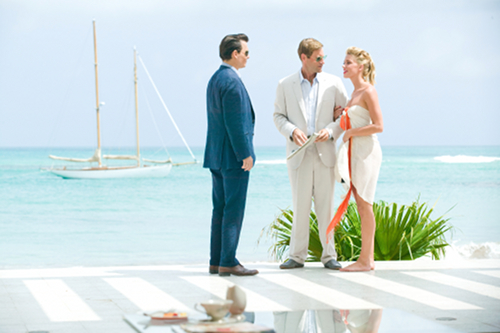
Meeting the despoilers: Depp, Eckhart, Heard.
Money's got Mr. Robinson on a roll: "It's a horrible deity! I'm not remotely religious, but I'd rather have God than mammon! And we are worshipping this deity that produces nothing, does nothing. You know, they don't make a Caesar salad, these banks. All they do is trade money, and it's really dangerous for our societies. You know, look at Europe, it's bankrupt! You get these guys who carry on and dig themselves into enormous bonuses -- so the tax-payers are cast into re-funding these bandits. I feel quite strongly about that, so there are hints of that in The Rum Diary."
The film offers much amusement and also many cultural, economic, racial and sexual themes to consider. In the recent Vanity Fair, Amber Heard is quoted as saying of her character's interaction that there's, "something kind of pure and virginal about it." Um, that's 100 percent inaccurate. But nonetheless, she's involved in a very noteworthy and potentially racist sequence in which she's drunk and kind of "put to use" in a mostly-black after-hours club. The climax is pivotal, plus it's taken from Thompson's book (distinctly from the paranoid P.O.V. of a Southern-American guy, pre-Civil Rights), but when I ask Robinson how he approached directing the volatile sequence, he waffles race for sex and then gently contemplates tone:
"It was actually vulgar, I thought, in the book. But I loved the idea of that scene, so we shot it, in reality, in a more graphic way, it was much sexier in the original assembly. But again, a strain of vulgarity, or even slightly misogynistic. So we kept pulling it back and cutting it down. The thing that's so tricky with this sort of material is that you can do something and drop your laugh, and the audience start thinking it's a different kind of film, and they won't laugh anymore."
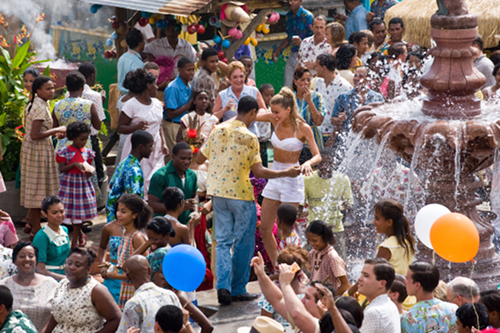
Carnivál with Heard as the "virginal" Chenault. Uh-huh.
Perhaps my question isn't his topic of choice, but Robinson, whose Rum Diary was beautifully lensed (by Dariusz Wolski, of Pirates fame) on Super-16 celluloid and exudes period- and location-authenticity, nonetheless feels very strongly about how to make a movie: "If you're talking about doing it in Hollywood, I most certainly will not. If it's Johnny Depp's type of Hollywood, then yes, I would. But that studio system just does not suit me. I feel very, very uncomfortable in those environments -- it feels like the worst place to make a movie. So one of the criteria that I discussed with Johnny was that, you know, I have to shoot this all on location -- and if a wall is in the way, we've got to knock the bloody wall down. And he went along with that, so consequently it is all, every frame, shot on location, in Puerto Rico. And I feel comfortable there.
"The person to thank for all of this, obviously, is the man -- because without Johnny none of this would be onscreen, and indeed without Johnny going after me, I would never have done it. I had no intention of directing this, or anything else. But because he's such an enormous star, and he's confident and he was really nagging me to do it, I just thought: 'What the hell, if someone in your position can take that risk, I'll go for it.' So we did, and we had a really solid working relationship."
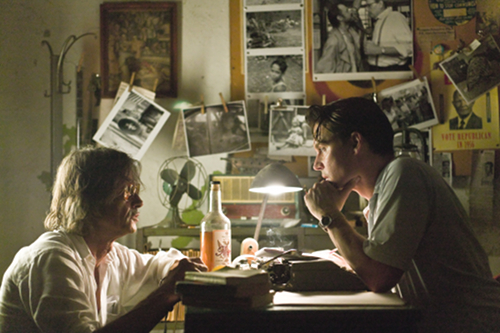
Solid: Robinson and Depp.
Perhaps being a bit of an idealistic journalist myself, I commend Mr. Robinson on the fascinating portraiture and shrewd political views of their Rum Diary, and suggest that audiences are really going to dig it.
"Well, let's hope, let's hope. You never know with a movie, do you? I think that the audience for this movie is not going to be the audience for Shrek, or Toy Story, or these massive, monster children's films that the film industry has degenerated into. And it really saddens me: that this extraordinary nation entertains itself with children's films. It never used to. I mean, in the golden age of American cinema: Dog Day Afternoon and The French Connection and Bonnie and Clyde and Butch Cassidy -- these were films for grownups, massively successful, massively entertaining. But now we're all required to go along and see animated dolls! I don't get it. Your country is worth so much more than the movies it entertains itself with!"
The Rum Diary is now playing in America, and opens around the world through March, 2012.
All photos courtesy of GK Films.